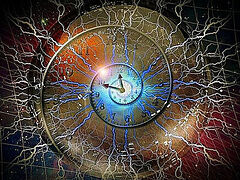We are approaching the end of 2023, and the New Year is nigh. We hope that the following reflections by Monk Vasily will help our readers better understand the meaning of time, to value the priceless gift more greatly from God, and to better distinguish the temporal from the eternal…
What is time? Who is capable of briefly and clearly defining it? And after all, in our discussions, we talk about nothing with more certainty and such frequency than about time, and when we do talk about it, we undoubtedly understand what we are talking about, and when we hear the word in conversation, we understand what is being spoken of. So, what is time? Back at the close of the fourth century, Blessed Augustine of Hippo, one of the fathers and teachers of the Church, wrote, “As long as I am not asked, I know the answer, but when someone asks me to explain it, I realize that I know nothing.”
The nature of time is beyond our comprehension. Time is like the wind: we do not see it but evaluate it according to its effects. In striving to comprehend the mystery of time, in ancient times man was convinced that “everything flows past, everything changes,” just as he himself does. God created time before He created man, whom he created holy, immortal, “in His image and after His likeness.”
Man was immortal, and time had no effect on him. However, he was given a Commandment and was warned of God’s punishment for disobedience: Thou shalt surely die... (Gen. 2:17). This means that life did not depend upon time, but on the way of life, on obeying God’s Commandment. However, with Adam’s committing of a transgression, with his sin, he fell under the power of time, i.e., he became corruptible and mortal. Throughout his entire life, he repented and wept, but by his own powers could not once again be like unto God.
Following Christ’s Resurrection, there came the “time of reformation...” (Heb. 9:10), a time of reforming by grace. God renews man, but now in concert with him, so that through recognition of the Truth and obedience to God’s Commandments, his will, merging with God’s will, might be holy. The Apostle Paul teaches, That ye have heard Him, and have been taught by Him, as the Truth is in Jesus: that ye put off concerning the former conversation the old man, which is corrupt according to the deceitful lusts; and be renewed in the spirit of your mind; and that ye put on the new man, which after God is created in righteousness and true holiness… (Eph. 4:21–24).
From this, one can grasp the course of life: Good works in the name of the Lord is the means to “redeeming” the time of our life, leading unto eternity, unto knowledge of God. And thus, doing good becomes a measure of time, its price, not astronomic time, but conscious, ontological (existential), spiritual (as distinguished from vegetative) time. It may be called “human” time. Holy Hierarch St. John Chrysostom wrote, “If you lose money, you can regain it, but if you kill time in vain pursuits, you cannot move it around. And after all, God gave us time in which to learn piety.”
For this reason, the Apostle Paul calls for redeeming the time (Eph. 5:16), for we often lose or spend it freely and uselessly, or even worse, we “kill time.” Therefore, there is no “sacred” or “non-sacred” time. All of the days of the Lord are holy and wonderful, for the Lord is kind to both the good and the evil. However, the days are evil (Eph. 5:16) through people’s evil acts and evil thoughts. Accordingly, “evil sufficient unto the day” is as if it were a different measure of the time, or essence, of the day.
Love for God and man leads unto eternity, becomes man’s true and highest good, the treasure of all his life, the true content and fulfillment (i.e. filling up) of each moment, and accordingly is the greatest measurement of spiritual time. The Holy Fathers say that the purpose of the creation of the entire world, and consequently, of time, is love. The reason for Christ’s coming into the world is love for man. And the time of life given “is redeemed” by man through his love in return. Thus, we are commanded: Rejoice evermore. Pray without ceasing (I Thess. 5:16–17), so as to spend every moment of time in our life keeping in mind God, the fount of love, and striving to acquire love. From patristic writings we find that the soul that has achieved love is outside of space and time.
Contemporary science concedes that in the material world there is nothing unchanging and eternal, and that the visible world at some point had a beginning, and consequently, will have an end.
If everything is so inexorably changeable, how are we to understand the PRESENT (of course, not in the secular sense)? The day-to-day course it runs and present time itself is not only the result of all past time, but in this present, there are always rudiments of its future, affecting the present. On the other hand, the past, in relation to which today’s present was the future, affected and continues to affect the present, and through it, the future. However, if we have little grain, if the harvest was poor, we use it sparingly, saving some for the future. Thus, the past and the future affect the present, which, in its turn, affects the future. There is a folk saying: “the day feeds the year,” and in that bit of folk wisdom we find the idea of the links within time. Yet “man does not live by bread alone.” If he believes in the future reward and the resurrection of the dead, that faith affects his present life, for in his present, he is already seeking first the kingdom of God,
And His righteousness…” (Matt. 6:33). And that kind of life fundamentally differs from that of one who does not believe: The times are marvelously interrelated, and in everything, God’s ineffable providence rules. Human thought constantly strives to penetrate the timeless. But how does one fathom that immutable, timeless, eternal–that which was, is and remains forever? For one outside faith and the Church, this is impossible, for he himself is temporal and subject to corruption. But thanks be unto God, which always causesth us to triumph in Christ, and maketh manifest the savour of His knowledge by us in every place… (2 Cor. 2:14). In Christ, the mystery of time is revealed to us. The Holy Apostle John the Theologian clearly bore witness to it, saying, I am Alpha and Omega, the beginning and the ending… (Rev. 1:8), and we need but to again recognize that. The Lord God is our Existent One. He is the Present, in Him is the beginning and the end, the past and the future, the Eternal. Therefore, without the Lord man has neither the future nor the eternal. In Christ, through love, eternity is revealed to the world, and the Church is filled with living, unceasing, remembrance of the Lord, and of His glorious coming.
In that salvific remembrance of the Holy faith, the times merge—that which is past, that which is to come, through the present. In such remembrance, Alpha and Omega merge into One, For the love of Christ constraineth us… (2 Cor. 5:14). By daily announcing on earth the Good News of the Kingdom of Heaven, the Church reconciles and “unites” within its life the earthly and the heavenly, the temporal and the eternal. In the Mystery of Holy Communion of the Body and Blood of Christ, man contacts eternity. The unruly spirit constantly immersed in the disorderly present world dies down, and the temporal atrophies and dies away. One’s spirit makes contact with that boundary Omega, i.e., with completion, passing into eternity. Astronomical time is related to man’s biorhythms, with his vegetative life, and inexorably leads to death. Church time is directed toward the soul, toward dogmatic realization, toward man’s remembrance of God and temporal death, and leads unto life eternal. Holy Hierarch St. Gregory the Theologian writes, “At the final step of the development of self-awareness, man is distracted from everything empirical and relative, and comes to awareness of himself as a spirit rising above the conditions of space and time.”
Our life is a chain of uncompleted works. We should take a moment to consider what we have accomplished; immediately, we call to mind letters unanswered, friends half-forgotten, and many other things. Time passes, and we lag behind. We work more and more, and yet get less enjoyment out of life. And the problem lies not in a lack of time, but in the hierarchical order of what we value. It would be unjust to call time the problem or even worse, to call it a tyrant. In so doing, we focus on symptoms instead of on the causes of the illness. Time measures movement and changes in the challenges that result from decisions we make, the goals we set, and our desires. The tyranny of matters that cannot be put off is not in the nature of time. Tensions and disappointments grow from the fact that we set ourselves unreasonable tasks or try to squeeze in too many matters in the slice of time remaining. Pressing matters, however less important they may be, demand immediate response, and devour all our time. Demands that cannot be put off pursue us from all sides from the moment we awaken until we finally go off to sleep. To oppose those demands seems an impossibility, and they rob us of all our powers. However, look at those problems from the frame of reference of eternity, and the idea that they are crucial this very minute instantly fades away. With a sense of needless waste, we call to mind the important matters we have put aside, and we admit that we have become slaves to matters “that cannot be put off.” Yet, to make time for our friend is within our grasp. However, first we must ask ourselves the question, “Where in fact are we headed?” “What goal are we setting for ourselves in life?”
Time will become our friend if we turn it moment by moment into ever more perfect actions. To strive to achieve what you want, effectively, creatively, with inspiration—that is the gist of the matter. The fundamental principle is that we either use time or lose it. To use our personal time is one of the most important personal habits essential to “contemporary” Christianity. But we must remember that the very term, “using time”, is inaccurate. Man cannot do anything with time itself, he can neither hurry it nor slow it down, neither save nor lose it. Least of all is man able to “control” it. The question is, what will we do within the boundaries of the time given us, how will we plan our affairs, organize them, in what order will we take them on, and what purpose will we accord them? We can only manage ourselves within the time given us. It is only in this sense that the imprecise expression, “to manage one’s time” can be applied. But do we have enough strength to do this? From childhood we are taught simple words of wisdom: Complete the task, and you can confidently enjoy yourself. There is time for work, and time for play. And beyond that? Oh, what guile do we not think up to justify our own indolence! There will be time to do it; one is wiser in the morning than in the evening; look, it is going to resolve itself; today I am not in shape, but tomorrow I will certainly do it better; you need to get a lot of rest before doing serious work; again, they are keeping me from doing my work. Our cunning stratagems are endless, and our disingenuousness knows no bounds. And no matter to whom one might say such words, they are all ultimately addressed to oneself. We deceive ourselves and only ourselves. And the paybacks for such seemingly innocent deception are neglected illnesses, unfinished tasks, and perhaps even a ruinous fate. After all, everything begins with trivialities…
“You have a lot of homework. Do at least part of it,” says mother.
“Nonsense, it will get done. May I go play football? Okay?” That is something typical during our childhood. Football goes on until late evening, the homework is not done, and the next day a big “D” appears in the ledger. Unfortunately, we have not learned anything from life. As adults, we sometimes procrastinate just as easily in doing unpleasant tasks and responsibilities. However, while in childhood we may have been naive and guileless, with age we have developed a system of explanations/excuses for any given situation in life, and already have difficulty distinguishing between actual impediments to solving our problems and our preconceived notions. We make good resolutions to correct our life, and once again forget about them. What are we, slaves to an overwhelming schedule, to do?
First, you have to apply some time on [working on] yourself.
The more we think about time, the more we realize how unique is that resource. Time is not simply something that you “receive,” or “have.” It cannot be borrowed from someone else who seemingly has more than enough. When your time passes away, so does your life. And how you spend your time, perhaps more than anything else, determines what kind of person you are: your values, your beliefs and goals, your uniqueness as an individual. Thus, devoting time to yourself, to your personal growth, development, and habits, is essential toward serving God and your neighbor.
I would like to close with the words of Apostle Paul, As we have therefore opportunity, let us do good unto all men, especially unto them who are of the household of faith… (Gal. 6:10).




